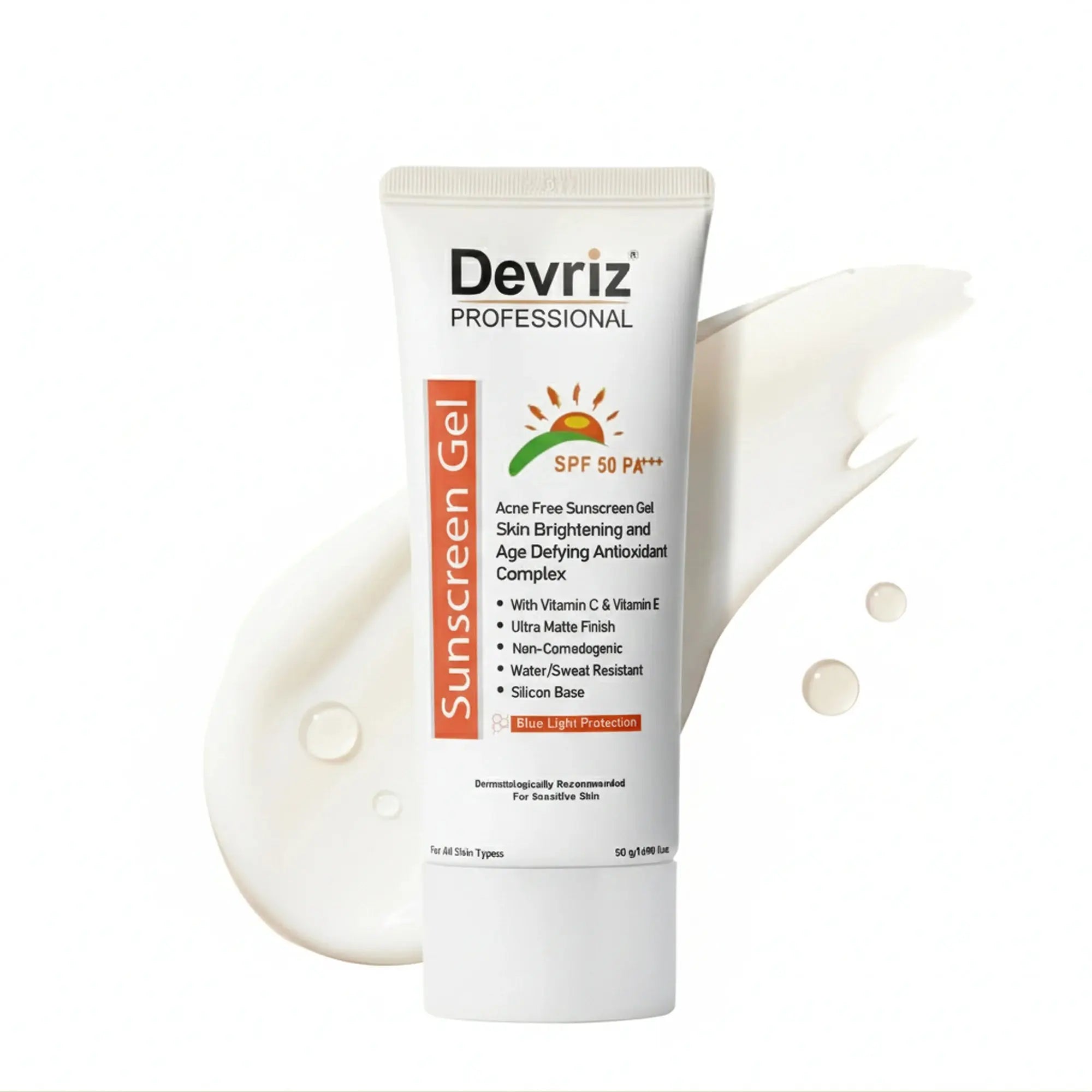
Introduction
Pigmentation is one of the leading concerns when it comes to skin problems that people face now-a-days. Especially in India with lots of sun exposure, pollution and lifestyle, pigmentation can’t be avoided by many which lead to stressful days for a majority of them. Whether it be dark spots, uneven tone or melasma, pigmentation can compromise both your complexion and confidence.
The good news is pigmentation can be dealt with, and well and truly managed through the right skincare regime. In this blog, let’s get to know what pigmentation is, the causes and the best treatments for it – professional products like the Pigmentation Treatment Kit, Night Cream & Skin Brightening Facewash by Devriz Healthcare.
What is Pigmentation?
Pigmentation is the natural colour of skin as a result of pigment being present in the skin. Melanin, produced by the cells we call melanocytes, is what gives you your natural skin tone. But when this melanin production develops an uneven or intense response, hyperpigmentation can present as dark patches, spots and inconsistent skin color.
Harmless pigmentation is not dangerous but it may be cosmetic nuisance. But it’s most often caused by a handful of external and internal factors that overstimulate melanin.

Common Causes of Pigmentation
1. Sun Exposure
The sun is the biggest contributor to pigmentation. UV rays stimulate melanin production, leading to tanning and dark spots. Without proper sun protection, pigmentation worsens over time.
2. Hormonal Changes
Hormonal imbalances, especially in women during pregnancy or while taking birth control pills, can cause melasma — a form of pigmentation that appears on the cheeks, forehead, and upper lip.
3. Post-Inflammatory Pigmentation
Acne, eczema, or even minor injuries can leave behind dark marks. This type of pigmentation is known as post-inflammatory hyperpigmentation (PIH).
4. Aging and Lifestyle
As we age, the skin’s natural cell turnover slows down, allowing pigment to settle deeper. Unhealthy habits such as smoking or irregular sleep worsen the condition.
5. Genetic Factors
Some individuals are genetically more prone to pigmentation due to their skin type or family history.

Types of Pigmentation
Melasma
Melasma is characterized by brown or gray patches that usually appear on the face. It is often linked to hormonal changes and sun exposure.
Sunspots
Also known as solar lentigines, these are caused by prolonged UV exposure. They commonly appear on areas frequently exposed to sunlight — face, arms, and shoulders.
Freckles
Freckles are small brown spots that often become darker with sun exposure. While harmless, they are still considered a type of pigmentation.
Post-Inflammatory Hyperpigmentation (PIH)
Dark marks left behind by pimples or injuries fall under this category. It’s common in acne-prone skin and can fade with consistent care.
How to Treat Pigmentation
Pigmentation requires a combination of skincare products, lifestyle changes, and sometimes medical treatments. Let’s go step-by-step.
Step 1: Use Gentle Cleansers
Start with a mild, brightening cleanser like the Skin Brightening Facewash from Devriz Healthcare. It helps remove impurities, balances oil, and preps the skin for treatment without irritation.
Step 2: Exfoliate Regularly
Gentle exfoliation removes dead cells and improves skin tone. Look for mild exfoliants containing glycollic acid or lactic acid.
Step 3: Apply Targeted Treatments
Products formulated to reduce pigmentation, such as Pigmentation Treatment Kits, combine active ingredients like kojic acid, alpha arbutin, and vitamin C to lighten dark spots and even out tone.
Step 4: Protect with Sunscreen
Sunscreen is your best defense against pigmentation. Use SPF 30 or higher daily, even indoors. It prevents new spots and stops existing ones from worsening.
Step 5: Nourish with a Night Cream
A restorative night cream supports skin repair and renewal while you sleep. This helps in lightening pigmentation and improving texture over time.

Advanced Clinical Treatments for Pigmentation
1. Chemical Peels
These treatments use mild acids to remove the outer pigmented layer, revealing fresh, clear skin beneath.
2. Laser Therapy
Laser treatments target and break down pigment deposits, suitable for deeper pigmentation issues.
3. Microdermabrasion
A gentle exfoliation procedure that removes dead cells and stimulates collagen production.
These treatments should always be done by certified dermatologists for safe and effective results.
Natural Remedies to Support Pigmentation Treatment
Aloe Vera
Aloe vera contains aloin, a natural depigmenting compound that helps fade dark spots.
Licorice Extract
Licorice brightens skin by inhibiting the enzyme responsible for melanin production.
Green Tea Extract
Its antioxidants reduce oxidative stress and help control pigmentation.
Vitamin C
A potent antioxidant that reduces pigmentation and enhances skin brightness.
Preventive Tips for Pigmentation
- Apply sunscreen every day, even on cloudy days.
- Avoid direct sunlight during peak hours (10 AM to 4 PM).
- Maintain a balanced diet rich in vitamin C and antioxidants.
- Avoid harsh scrubs or picking at acne.
- Stick to a consistent skincare routine with products like Pigmentation Treatment Kit and Night Cream from Devriz Healthcare.
Why Choose Devriz Healthcare for Pigmentation Care
At Devriz Healthcare it is not a skin care but healing and protection of your skin to highlight natural beauty. Their Pigmentation Treatment Kit is focused on dark spots and an uneven tone, whereas the Skin Brightening Facewash purifies deeply skin to brings the natural shine back. Enriched with the Night Cream that works overnight to nourish skin and provides bright, clear and visible complexion.
Every product is made from high quality, safe and dermatologist tested ingredients that are suitable for Indian skin.
Conclusion
You may have stubborn pigmentation, but it’s entirely manageable with the right care. It’s only if you understand the causes that you’ll be able to choose treatments that work for your body. This is a system that comprises of daily cleansing with Skin Brightening Facewash, target care using Pigmentation Treatment Kit and overnight repair through Night Cream.
Whether for a clear complexion, hydration or more visible radiance, your skin deserves the best treatment.
Add to cart for healthier, nourished skin. Shop with Devriz Healthcare.
FAQs
-
What is pigmentation?
Pigmentation is the uneven darkening of skin caused by excess melanin production.
-
What causes pigmentation on the face?
Sun exposure, hormonal changes, acne, and ageing are the most common causes of pigmentation.
-
Can pigmentation be treated permanently?
While permanent removal isn’t always possible, consistent skincare can fade pigmentation significantly.
-
Which products help reduce pigmentation?
Use a Pigmentation Treatment Kit, Skin Brightening Facewash, and a Night Cream for visible results.
-
Does sunscreen help prevent pigmentation?
Yes, daily sunscreen prevents UV rays from darkening existing spots and forming new ones.
-
Can pigmentation occur without sun exposure?
Yes, hormonal and post-inflammatory pigmentation can occur even without sun exposure.
-
How long does it take to fade pigmentation?
Results vary, but noticeable improvement often appears within 4–6 weeks of consistent care.
-
Is pigmentation more common in Indian skin?
Yes, melanin-rich skin types are more prone to pigmentation.
-
Do natural remedies work for pigmentation?
They can help support results but work best when combined with professional treatments.
-
Can I use makeup over pigmentation treatments?
Yes, but ensure your skincare is fully absorbed before applying makeup.
-
Is pigmentation the same as tanning?
No, tanning is temporary darkening, while pigmentation is uneven melanin buildup.
-
Should I exfoliate daily for pigmentation?
No, 2–3 times a week is enough to avoid irritation.
-
Does lack of sleep cause pigmentation?
Indirectly, yes. Fatigue and stress can make your skin dull and uneven.
-
Can pigmentation come back after treatment?
Yes, if not protected from the sun, pigmentation can reappear.
-
What is the best skincare routine for pigmentation?
Cleanse with a Skin Brightening Facewash, treat with a Pigmentation Treatment Kit, use sunscreen daily, and repair with a Night Cream at night.





